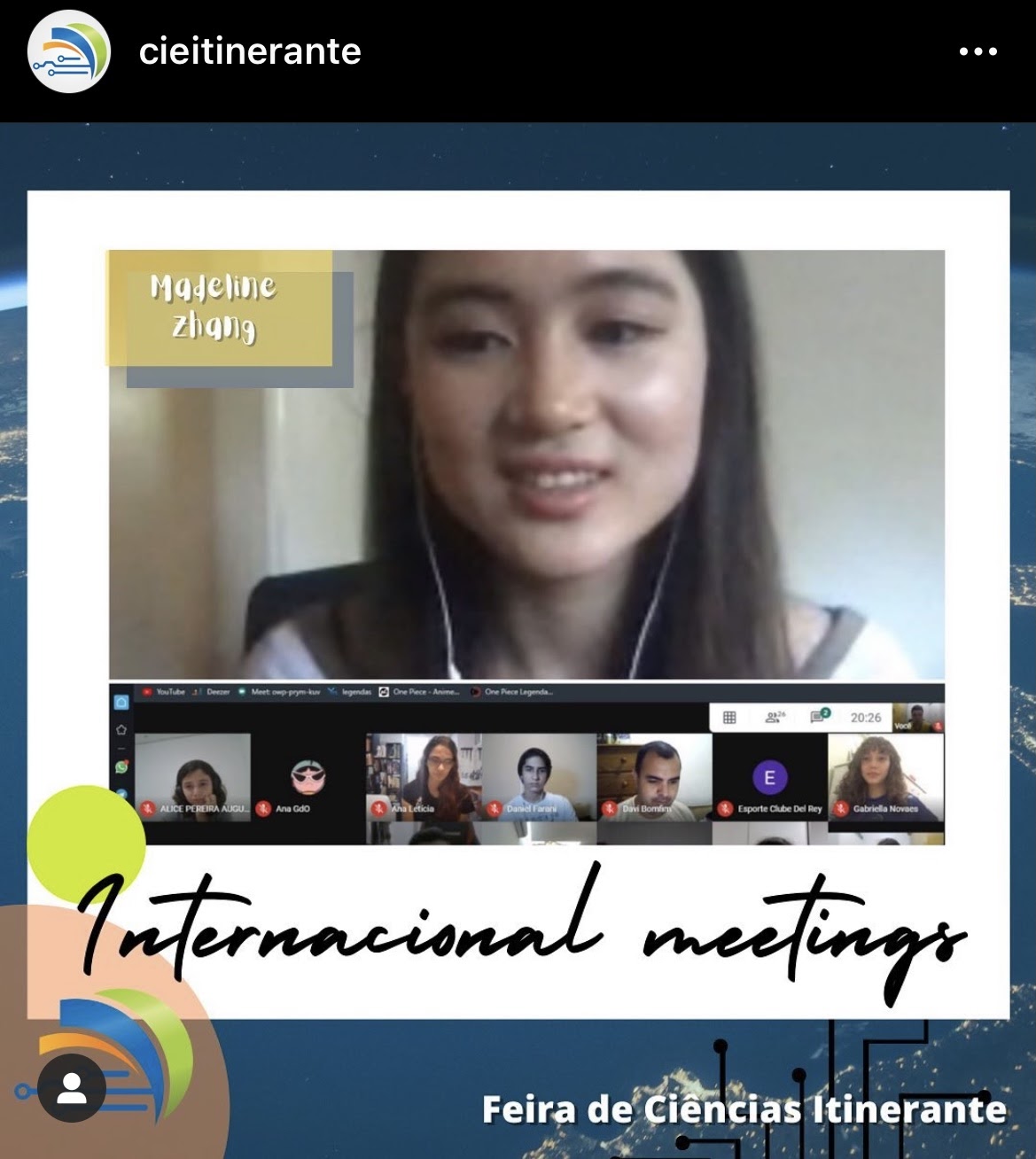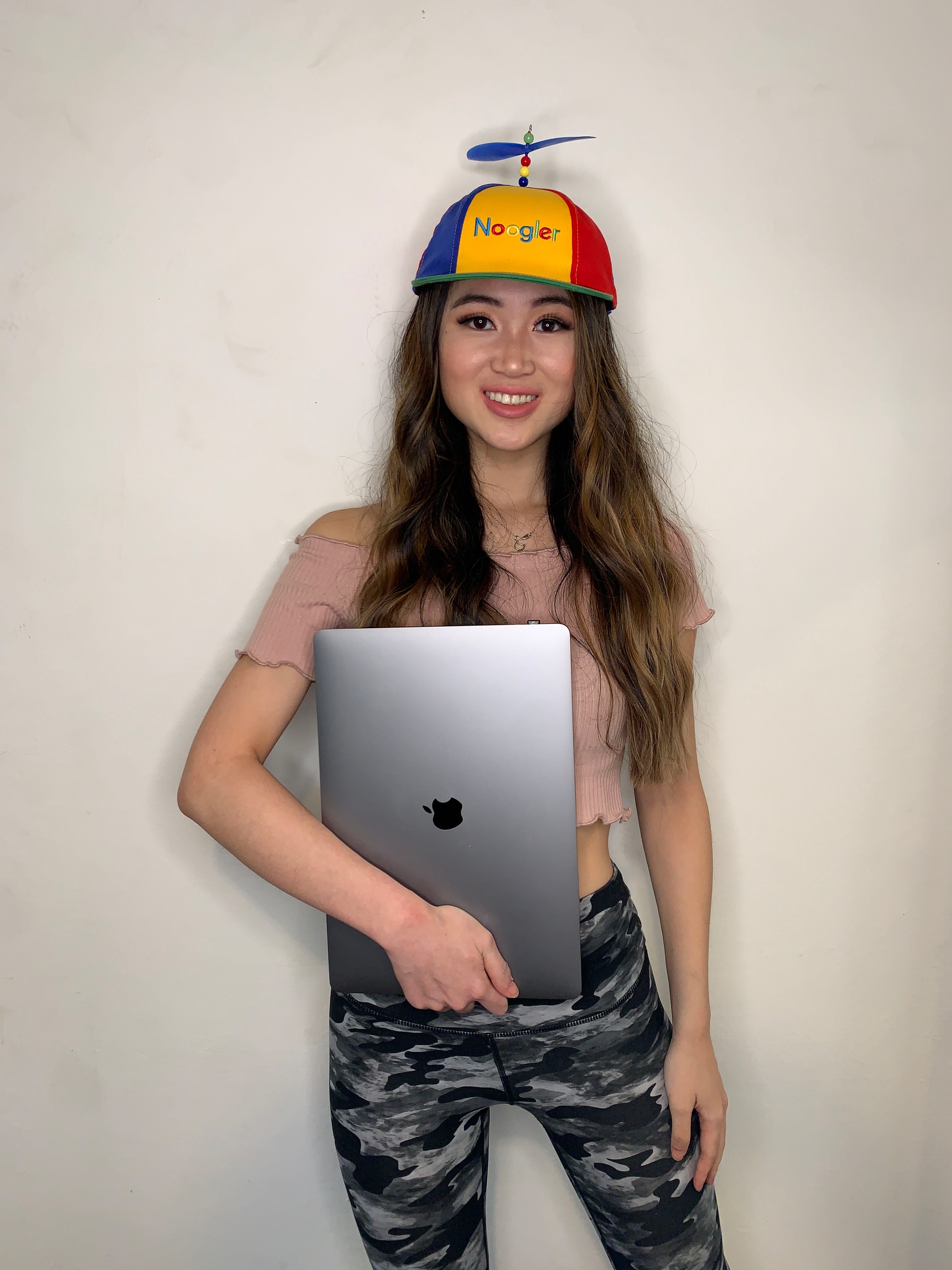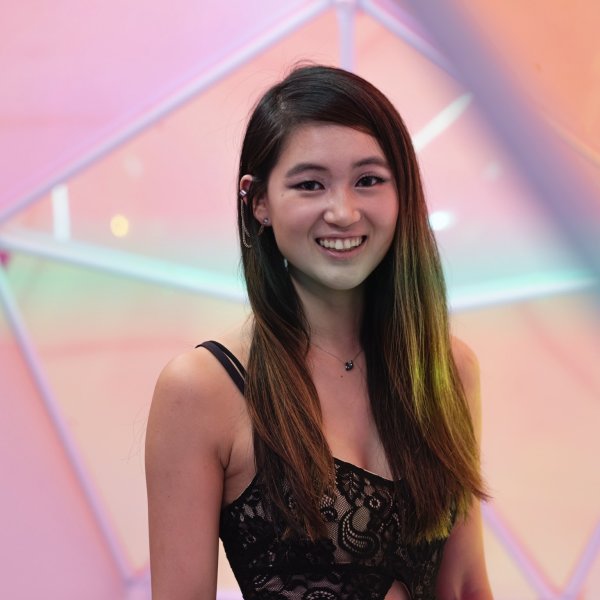Tell us about yourself, Madeline. What makes you uniquely you? Can you tell me a bit about your background, your hobbies, your human experience?
Hi! I’m a software engineer at Google. I’m passionate about STEM outreach, and I am very interested in web dev and programming video games. Born and raised in California, I went to college on the east coast, so I have a soft spot for New England springtime. In my free time, I love running, singing, playing board games, solving puzzle hunts and escape rooms, and watching way too many Reddit cute cat videos.
What makes me, me, is that when I get interested in something, I get extremely into it and give it my absolute all. This ranges from a quarantine crocheting phase where I crocheted for 20 hours straight until I finished an amigurumi bunny, to learning how to sing several Bulgarian songs and arranging piano accompaniments for them because I wanted to improve my Bulgarian language skills, to running everyday for the past 2.5 years. My current obsession / interest is playing social deception board games - I’ve been playing a particular one (Blood on the Clock Tower) 4 days a week, at least 3 hours a day, for the past few weeks.
While just getting started with a wildly impressive role as a Software Engineer at Google in the Health Business Unit, you have had absolutely no shortage of incredible work experience. In some way, you always seem to map your love of engineering with some cause for the greater good. Can you tell us a bit about this mission critical ethos, using coding for a greater cause?
Yep! I’m passionate about using software and tech for altruistic causes. When I started university, I actually wanted to study biology and become a doctor. I ended up pivoting towards computer science, but my passion for biology and trying my best to help others stayed strong. I think coding is so powerful because of its versatility - software engineers with the same skill set can make an impact in lots of different fields, from medicine to academia to environmental sciences.
At MIT, I worked as an undergraduate researcher at D-Lab, developing Bayesian modeling algorithms and creating a Django server to diagnose pulmonary disease in rural South East Asian populations. Also, for a MIT program called Patrones Hermosos (Beautiful Patterns), I travelled to Aguascalientes, Mexico, where the other instructors / TAs and I taught high school girls some basics of computer science, including search and sort algorithms, binary trees, web development and more. This experience meant an incredible deal to me, not only because of the passionate group of MIT instructors that I got to work with, but also because of the amazing Aguascalientes girls who were so eager to learn and also ended up teaching me so much. Finally, I was a mentor for MIT CodeIt, an educational outreach program that introduces middle school girls and nonbinary students to computer science, and taught weekly Scratch and Python lessons.
Patrones Hermosos instructors - 2019
You once worked on a project at your alma mater MIT (Massachusetts Institute of Technology) called “Code for Good Consulting” This initiative has allowed you to work on mission driven projects that have allowed technology to intersect with people, places and limitations, all over the world. How do you remain laser focused on this as your career evolves?
Being a part of Code For Good Consulting was such an amazing, rewarding experience. MIT Code For Good Consulting is a club that pairs local non-profits with student teams who build technological solutions for their assigned nonprofit.
I first heard about Code For Good purely by chance, but after going to an informational session, I felt it was a perfect fit for my goals and mission, and decided to apply. My team and I worked with Green Streets, an organization that promotes sustainable transportation by working with corporate partners to host fun commuter challenges to encourage walking, biking, and ride sharing. Later, I joined the executive team of Code For Good as part of the Dev Exec Committee.
Even after graduation, I still hold onto the values that drew me to and the skills that learned from Code For Good. I help out with Google’s university outreach efforts quite often (e.g. tech panels, resume reviews, career fairs, mock interviews). Also, during the pandemic, I’ve been a virtual speaker for various nonprofits and technology / STEM outreach focused organizations, including Feira de Ciências Itinerante (a nonprofit which provides science and technology resources to public school students in Brazil), Codeista (a youth-led organization which uses technology to encourage STEM participation in the fashion industry), Girl Genius (an online magazine which promotes female leaders and participation in STEM), and InTechual (a youth-led organization which empowers students to pursue technology careers and programming).
 Feira de Ciências Itinerante virtual speech - 2020
Feira de Ciências Itinerante virtual speech - 2020
You have been known to help new software engineers get into the field. What are the top tips that you would give to a new software engineer coming into the field right now based on your experience?
I’d say that it is very likely, especially for junior engineers starting in the field of software engineering, to experience imposter syndrome. Imposter syndrome is a phenomenon in which people (often high-achieving ones) doubt their own abilities and skills, assume that they achieved any successes due purely to luck, and are afraid they will eventually be “found out”. It is something that I personally struggled with throughout my entire life and still gripe with to this very day, and it is extremely common not just in the software realm but also in many other scenarios, as there are reports that ~70% of individuals have suffered from imposter syndrome at some point in their lives.
In order to effectively start combating imposter syndrome, one has to acknowledge their thoughts and put them in perspective. It’s important to realize that in a scenario where >50% of the population believes they are inadequate, it is mathematically impossible that every one of them is actually low-achieving. Because people often don’t broadcast their mistakes and failures to others and only showcase their successes, I have seen many new software engineers panic because they are aware only of others’ achievements, making them very self-conscious on asking questions (which is totally normal and should be encouraged!) due to fear of appearing unintelligent. Another tip is that one should definitely try to find a mentor who has been a software engineer for a longer period of time. Having the perspective and advice of a more senior member of the software engineering field will be invaluable, especially one who works for the same company.
You have always been quite busy. As the valedictorian of your Albany High School and the president or vice president of what seems like an unmatchable list of clubs, varsity sports, commitments and extracurriculars, what experience do you feel has shaped you the most.
I have certainly done my fair share of extracurriculars in the past, and all of them have impacted me significantly, each in their own way. However, if I had to pick, I’d say that being president of MIT Model United Nations (MITMUNC) has shaped me the most. When I started running MITMUNC during my sophomore year, I really had no idea what I was getting into. In the end, I learned a lot, both about myself and about how to effectively lead an organization.
Throughout my presidency, I oversaw many moving parts, including sponsorship negotiations, merchandise design and shipping, topic planning and background guide writing, venue booking, website coding and updating, and retreat planning. As a result, I learned a lot about project management techniques, a skill I utilize to this very day. MITMUNC also taught me how to think on my feet - I had to put out quite a few fires, including a gas leak scare that required the evacuation of a building in the middle of our conference, disputes between rival schools, several attendee health issues, and delayed shipments.
In addition, I also helped organize our international branch and went to Shanghai China, twice for MITMUNC China, a high school Model UN conference we held with ASDAN China, a educational charity which hosts skills-based student conferences and international educational programmes specialising in China. During those trips, it was fascinating to learn about the parallels between American Model UN and the international circuit.
Madeline With MITMUNC X Guest Speakers - Bengt Holmström (pictured left), recipient of the 2016 Nobel Prize in Economics, and Esther Duflo (pictured right), recipient of the 2019 Nobel Prize in Economics
MIT Model United Nations Secretariat - 2020
Where can people find you or get in touch? How can people get involved in ultimately giving back to things you truly care about? What are some projects, productions and adventures you're really proud of and would like others to know about?
Please feel free to reach out to me on Instagram @madeline.m.zhang or LinkedIn @Madeline Zhang.
If you are in university, I’d highly recommend getting involved in any tech for nonprofits / mentoring extracurriculars if your college has any, or reaching out to local nonprofits directly to help with their causes. I’m proud of my part in building Google’s COVID19 self assessment and the Valentine’s Day themed escape room I helped build.

